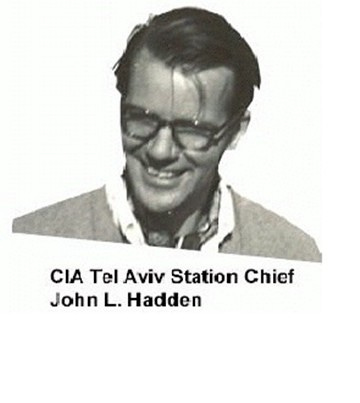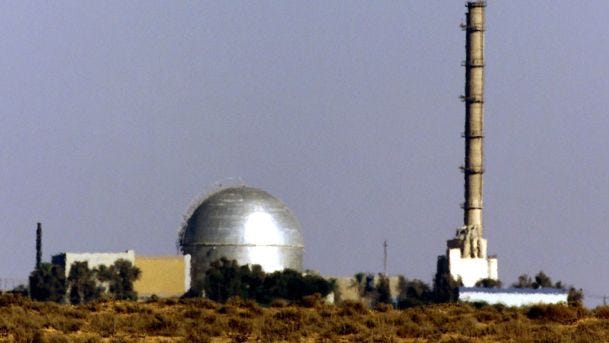John Hadden: Conversations With a Masked Man
In the 1960s, when John Hadden was a teenager, he went on a picnic with his family in the Negev desert. The family drove out in his father’s Ford Falcon to a remote, arid area and stopped near the city of Dimona.
Hadden and his siblings unwrapped the wax paper around their peanut butter sandwiches and watched as their father used garden shears to clip shrubs on the side of the highway.
“The memory’s so vivid in my mind, even after all this time,” Hadden told me over the phone, “I think it was because of the garden shears. My father never had anything to do with gardening- woodworking, sure- but never the gardening.”
It turned out Hadden’s father wanted to clip the shrubs in the desert for a reason that had little to do with family recreation. He needed the clippings as proof of Israel’s nuclear program.
Hadden’s father, you see, was a CIA spy.
[C]onversations With a Masked Man: My Father, the CIA, and Me is Hadden’s first book. The book uses conversations between father and son after September 11, 2001, as the framing device for a reflection on history, memory, and American masculinity.
“The book is mostly about my relationship with my father,” Hadden explained, “We were constantly fighting at the diner table, through the lens of this political stuff.”
“Pop,” as Hadden refers to his father, regularly outclassed his son in historical and political knowledge. The older Hadden was an encyclopedia of facts, dates, names, and places.
Still, Hadden believes he put up a good fight. After all, “we were actually fighting about what it means to be an American male.”
Pop was a product of the post World War Two era, a “Humphrey Bogart type” whose work with the CIA took him all over the world. The day Hadden was born, Pop was in East Berlin, trying to trade agents with the Soviets.
“The reception has been great amongst those who have read it,” Hadden said, “And people are getting out of it what they put in.”
”If you’re really into family dynamics, it’s a book about family dynamics,” he explained, “If you’re really into politics, it’s about politics.”
[P]op was given first edit.
“He first saw the book ten years ago. We had an agreement that he could edit anything he wanted.”
Editing became problematic.
“It would start with him crossing out a name, a procedure. Then a page, then a chapter. In the end he just asked me to wait until he was gone.”
Pop repeated those instructions on his deathbed. Hadden took his father up on his dying wish and worked on the book tirelessly. Masked Man is finally published as of February 9, 2016.
Masked Man has notes from Pop in the appendix. The notes are mostly personal reminders. One document Hadden wishes he could have included is a report Pop made to the Department of Energy about the Israeli nuclear program after he had been retired for some years.
“The report has not been released,” he said, “There is reference to it in other documents, but the report has not been made public.”
The report, Hadden believes, contains the evidence his father collected on the Israeli nuclear program all those year ago in the Negev desert.
“A big part of my father’s work was tracking the development of Israel’s nuclear program,” Hadden said.
[I]sraeli policy on nuclear weapons has always been a policy of the Samson option. The theory is that if Israel is threatened, it can pull down the whole house on top of itself, taking the rest of the region out with it.
“My father always said they feel more threatened than they are,” Hadden said, “But he blamed the Americans for the Israeli’s situation more than them.”
Pop believed that by the Americans “rolling over and giving them whatever weapons they wanted” in a misguided attempt to keep Israel from developing the bomb, Israel now had a vested interest in appearing threatened. Thus a policy of ever increasing weaponry deliveries from America to the small country that began with Kennedy has continued to the present day.
Hadden said that his father found the symbiotic relationship between the two countries highly disturbing and borderline treasonous.
“My father watched these political transactions take place,” Hadden said, “He saw Senators and Ambassadors being bought by Mossad in the 1970s. Pop was in the business of recruiting agents. He knew what this was.”
[A]fter the shrub’s branches had been clipped and Pop was satisfied the family weren’t being watched, the Haddens piled back into the Falcon and drove home. It was an odd picnic, Hadden said, but they didn’t know the purpose of it for many years.
“There was an isotopic signature on the leaves of the plants,” Hadden explained.
That isotopic signature, U2–135, led directly back to the Pittsburgh company Nuclear Materials and Equipment Corporation (NUMEC). The company had lost over 200 kilograms of highly enriched uranium in 1965 and the suspicion was the material had been smuggled to Israel.
“It wasn’t a big problem to smuggle small, inert packages of the material to Israel,” chuckled Hadden, “After all, they smuggled a 200 pound package of Adolf Eichmann out of Argentina!”
Hadden’s father’s work proved without a doubt that the NUMEC material had ended up at the Israeli nuclear facility at Dimona.
“The isotopic signature is a tiny, tiny thing,” said Hadden. But, it is “actual, hard evidence” of the program.
“It’s all starting to come out” as reports become declassified, Hadden said, “The Israeli policy of plausible deniability [about its nuclear program] is less and less plausible.”
[spacer height=”20px”]
Conversations With a Masked Man is available online and in bookstores around the country.
[spacer height=”20px”]






